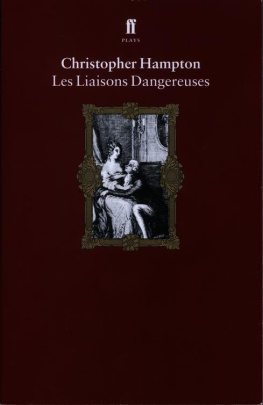The action takes place in various salons and bedrooms in a number of htels and chteaux in and around Paris, and in the Bois de Vincennes, one autumn and winter in the 1780s.
What is published here is the text of the play as it stood on the first day of rehearsal; and the various minor cuts and abrasions (and improvements) sustained and effected during rehearsals are therefore not included
In many respects, Pierre-Ambroise-Franois Choderlos de Laclos (17411803) is the perfect author: he wrote, at around the age of forty, one piece of fiction, which was not merely a masterpiece, but the supreme example of its genre, the epistolary novel; and then troubled the public no further.
Fortunately the obscurity from which, during his lifetime, this astonishing tourde force delivered him only briefly, has remained sufficiently deep to preserve his enigma. But those few facts which are known about him combine to throw an intriguing light on his vigorously classical novel.
A career soldier in an unusually extended period of peace, Laclos volunteered to serve in the American War of Independence, but lacked the means necessary to a campaign officer at the time. Instead, he was posted to a drab island in the Bay of Biscay and put in charge of its fortification. It was from here, bored and disappointed, that he wrote, famously, to a friend, announcing his intention to write something out of the ordinary, eyecatching, something that would resound around the world even after I had left it. Few artists can have fulfilled their predictions so satisfactorily.
The novel caused an immediate and continuing sensation, and in its wake Laclos addressed himself to two other pieces of work: a treatise on womens education, unpublished in his lifetime; and a blistering demolition of one of Frances military sacred cows, the tactician Marchal de Vauban, which caused such offence that he was immediately rewarded with a series of particularly dreary provincial postings.
In the Revolution he was a Jacobin, not prominent but assiduous, a friend of Danton and the associate and secretary of the Duc dOrlans, the kings liberal cousin, known as Philippe-galit. Inevitably during the Terror he was jailed twice and escaped execution, which he clearly expected, only narrowly and for reasons which have remained obscure. It took some time for him to be accepted back into the army, but eventually at the turn of the century he was made a general by Napoleon. The result, however, of this final success, was that only a few weeks after arriving in Taranto in Southern Italy to take up a new command, he died of dysentery and malaria. His last letter was a dignified but urgent appeal to Napoleon, asking for support for his wife and three children.
Geometrician, inventor, military strategist, feminist, revolutionary, devoted husband and father: all of these qualities, some initially surprising in the author of LesLiaisonsDangereuses, others less so, make their contribution towards a way of looking at this extraordinary and meteoric work: without, however, exhausting the pleasures of its rare mystery and merciless intelligence.
Christopher Hampton
A warm evening in August. The principal salon in the Paris htel of Mme la Marquise de Merteuil. The MARQUISE , a respectable widow of considerable means, is playing piquet with her cousin, MME DE VOLANGES , who is herself a widow. Sitting next to MME DE VOLANGES , watching her play and politely stifling the occasional yawn, is her daughter CCILE , a slim and attractive blonde girl of 15. Suggestions of great opulence. The large playing cards slap down on one another. MERTEUIL interrupts the game to examine CCILE with some care.
MERTEUIL: Well, my dear.
( CCILE , who has been daydreaming, starts, not quite sure, for a second, if its she whos being addressed.)
So youve left the convent for good?
CCILE: Yes, Madame.
MERTEUIL: And how are you adapting to the outside world?
CCILE: Very well, I think. Im so excited to have my own bedroom and dressing room.
VOLANGES: Ive advised her to watch and learn and be quiet except when spoken to. Shes very naturally still prone to confusion. Yesterday she was under the impression my shoemaker had come for dinner.
CCILE: It wasnt that, Maman, it was when he fell to his knees and caught hold of my foot. It startled me.
MERTEUIL: No doubt you thought he was attempting to propose marriage.
CCILE: I
(She breaks off, blushing.)
MERTEUIL: Never mind, my dear, youll soon get used to it.
We must see what we can devise for your amusement.
(The game resumes. Silence. After a time, Merteuils MAJORDOMO appears, advances unhurriedly across the room and murmurs something in MERTEUIL s ear. MERTEUIL sighs.)
Oh, very well, show him up.
(The MAJORDOMO bows and withdraws. MERTEUIL turns back to the others.)
Valmont is here.
VOLANGES: You receive him, do you?
MERTEUIL: Yes. So do you.
VOLANGES: I thought perhaps that under the circumstances
MERTEUIL: Under what circumstances? I dont believe I have any grounds for self-reproach
VOLANGES: On the contrary. As far as I know, youre virtually unique in that respect.
MERTEUIL: and, of course, if I had, he would no longer be calling on me.
( CCILE has been following this exchange closely, frowning in the attempt to make sense of it. Now MME DE VOLANGES turns to her.)
VOLANGES: Monsieur le Vicomte de Valmont, my child, whom you very probably dont remember, except that he is conspicuously charming, never opens his mouth without first calculating what damage he can do.
CCILE: Then why do you receive him, Maman?
VOLANGES: Everyone receives him. He has a distinguished name, a large fortune and a very pleasant manner. Youll soon find that society is riddled with such inconsistencies: were all aware of them, we all deplore them and in the end we all accommodate to them. Besides which, people are quite rightly afraid to provoke his malice. No one has the slightest respect for him; but everyone is very nice to him.
(She breaks off as the MAJORDOMO reappears, escorting LE VICOMTE DE VALMONT , a strikingly elegant figure. VALMONT crosses the room and bows formally to MERTEUIL in a gesture which also takes in the others











